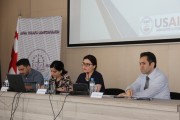
Presentation of the Monitoring Report of the High Council of Justice
Tbilisi - Nino Gvenetadze, Chief Justice of Georgia, and Giorgi Chkheidze, Promoting Rule of Law in Georgia (PROLoG), Deputy Chief of Party, East West Management Institute (EWMI), opened the presentation of High Council of Justice monitoring findings on June 27, 2015, 11:00 p.m., at High School of Justice - House of Justice. Georgian Young Lawyers’ Association and Transparency International - Georgia presented Three-Year Summary of Monitoring the High Council of Justice in the period of 2012-2014. The report summarizes the activities of the Council on the selection/appointment of judges, transfer of judges, transparency of the work of the Council, disciplinary proceedings against judges, etc. HCOJ monitoring efforts by GYLA and TI in past were supported by USAID’s Judicial Independence and Legal Empowerment Project (JILEP) and presently by new Rule of Law initiative – Promoting Rule of Law in Georgia (PROLoG) Activity implemented by East-West Management Institute.
The three-year monitoring revealed the following important findings:
During the three-year monitoring period the legislation and rules regulating activities of the Council were amended and became more specific and clear; the transparency of the work of the Council has increased; the access to public information has improved; the Council members became more active during deliberations at the Council meetings.
Despite positive changes some deficiencies are still observed in the HCOJ activities, which result from ineffective legislative regulation on one hand, and the misinterpretation of applicable legislative norms by the HCOJ on the other hand. Namely:
• Despite a number of legislative changes, there still does not exist the mechanism for monitoring the Council decisions which would make it possible to assess their objectivity, fairness, and impartiality regarding selection and appointment of judges, transfer of judges, disciplinary proceedings, and other issues. There is no legislative obligation for the Council to substantiate its decisions. Nor is it possible to assess the reasoning of the decisions based on minutes or by attending the Council meetings. Neither was the Council able to establish a good practice to fill the legislative ambiguities.
• The legislation fails to regulate the following activities of the Council: terms for decision making, participation of interested parties in decision making process, challenge of the Council member, substantiation of the Council decisions, and the obligation of the Council to investigate before making a decision on a disciplinary case. These issues proved to be problematic during the Council’s work.
• The Council’s interpretation concerning application of General Administrative Code of Georgia to its activities is not clearly established since the Council is not consistent in its position.
• There is no regulation established for appeal of the Council decisions and to exercise judicial control over these decisions.
• The issue of conflict of interests of the Council members is not regulated by the law.
• The low inclusiveness of the Council’s work has been a problem. The Council has not conducted a conference session with participation of interested parties and expert groups, provided by law.
• During all three stages of the monitoring advance publication of information on scheduled Council meetings remained a problem. This damages the transparency of the Council’s work and restricts interested groups from attending the meetings.
• The rules for closure of the Council meetings are vague. The Council was not publishing the information about closed meetings in advance. The decision about closure of a session was made by the chairman of the Council individually and not by the Council as a collegial body.
• The problems remained with the media coverage of the Council meetings. According to the decision of the Council the media can cover only the opening part of the Council meeting while there are no legislative restrictions established for media coverage of meetings of collegial administrative bodies.
• There were cases observed when the Council did not disclose public information.
As a result of monitoring, NGOs submitted relevant recommendations. Georgian Young Lawyers’ Association and Transparency International Georgia will continue the monitoring process and publish reports publicly on periodic manner.
About USAID in Georgia: During the past 23 years, the American people, through USAID, have invested more than $1.5 billion in Georgia. USAID projects are designed to support Georgia’s transition to a free and prosperous democracy and include initiatives to accelerate economic growth, develop democratic institutions, and improve health and education. USAID provides economic and humanitarian assistance in more than 100 countries. For more information, please visit http://georgia.usaid.gov
ჯ. კახიძის #15, თბილისი, საქართველო, 0102 ; ტელ: (995 32) 95 23 53; ფაქსი: (995 32) 92 32 11; ელ-ფოსტა: gyla@gyla.ge; www.gyla.ge
15, J. Kakhidze str. 0102, Tbilisi, Georgia. Tel: (995 32) 95 23 53; Fax: (995 32) 92 32 11; E-mail: gyla@gyla.ge; www.gyla.ge


